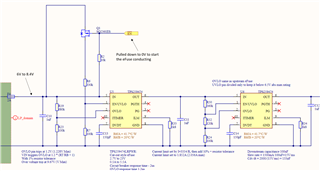I’m using a pair of TPS259474LRPWR in a design and after a little while of normal use, U5 failed in a worrying manner where the input shorted to the output and to ground internally and let the smoke out. I cannot work out why the eFuse failed because as far as I can tell, the design won’t let any of the pins go beyond their absolute maximum values.
Here is the circuit. The input can vary between 6-8.4V. The EN line gets pulled low off-sheet to switch on Q1 which should in turn start the eFuse conducting.
Is there anything wrong with this design that could allow the eFuse to catastrophically fail?


